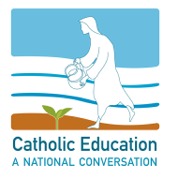
Opening the doors to the Victoria Room at the Ottawa Marriott Hotel reveals an inspiring scene.
It’s the Catholic Education: A National Conversation convention and each seat at every table is taken. Participants talk with one another, exchanging their own ideas and experiences about Catholic education, ultimately fulfilling the CCSTA mission: to have a national conversation about Catholic education.
The three-day convention took place in Ottawa from Sept. 22-24, bringing 250 delegates together from across the country.
From the West to East Coast, Canadian representation was evident; their presence an encouraging message to demonstrate Catholic education remains a priority across Canada.
Acting CCSTA President Ted Paszek called the convention a great success.
“I received nothing but positive comments from many delegates,” he says. “I think the presenters, liturgies and conversations combined to make a truly meaningful national exchange about Catholic education.”
Speakers Unite the Audience
Keynote speaker, Vatican journalist John L. Allen, opened participants’ eyes about the global Catholic Church as well as debunking myths about the Vatican. His presentation resonated well with the audience.
“We tend to think of ourselves in North America as the centre of the Church which we are not,” says Mr. Paszek. “We have to do some serious thinking about what this means for us here in Canada.”
Speaker Fr. Michael Dechant challenged the audience to be faithful to tradition, but open to new diversity and realities encountered in schools. As did Archbishop Collins.
Speaker Pierre Allard challenged the group to be forgiving people through restorative justice. Mr. Paszek says Allard’s comments have implications for the way educators conduct their Catholic classrooms.
“We have to continually examine how we treat children, our discipline policies and community building,” he says. “I liked his comment that our vision must be larger than our most serious problem because if not, our problem will sink us.”
Lou Rocha and the FACE project discussed promoting and protecting Catholic education in Ontario. This presentation taught participants how to declare the value of Catholic education to Canadian society without being confrontational.
Meanwhile, Sylvain Beauregard’s French presentation hit on the Franco-Ontarian Catholic school system and reflected on whether it will survive or follow Quebec’s lead.
Lastly, the student panel and the witness provided by those who presented the anecdotes brought a clear message to convention attendees.
“We were reminded that the strength in Catholic education is in the individual personal stories of ordinary people,” says Mr. Paszek.
Continuing the Conversation
Following the three-day convention, the Catholic education conversation brought a country together.
“It is the shared story that keeps us strong and it is reassuring to hear similar challenges, successes and experiences from across the country,” says Mr. Paszek. “It is important to remember the losses in Newfoundland and Quebec and to share experiences of funded, partially funded and unfunded Catholic education.”
He adds the Church has an important place in the very development of this country.
Mr. Paszek says he hopes the attendees came away from this conference better informed about the Church and the important role of Catholic education in Canada.
“I hope they had a good time and met some interesting new people and were able to share and develop a better understanding of each other,” he says. “Most of all, I hope they come away inspired to continue the work of Catholic education in the new and challenging circumstances we face across the country.”
- Session 3 – John Allen Jr.
- Session 4 – John Allen Jr.
- Session 5 – Fr. Michael Dechant – Part 1
- Session 5 – Fr. Michael Dechant – Part 2 What We Have Heard – Joan Cronin and Stefan Michniewski
- Session 7 – Pierre Allard
- Session 6 – Archbishop Collins
- Session 8 – Sylvain Beauregard
Categories:


Leave a comment